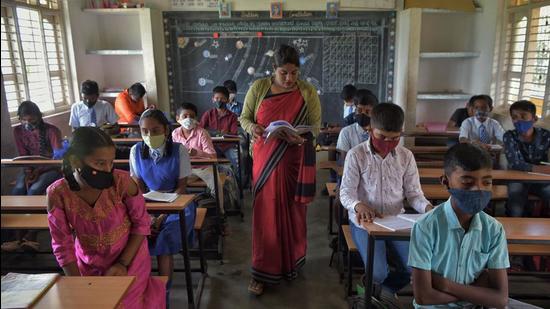Experts call for reopening of schools
Last year, 167 countries across the world had implemented measures like lockdowns and school closures to prevent transmission of a virus not very well understood at the time. Most countries re-opened schools slowly.
Schools must be reopened for in-person teaching for all age groups, a collective of epidemiologists has recommended, saying there was no evidence it would lead to a greater infection risk among children and that keeping them home will instead lead to lasting social and developmental impairment and increase inequality among privileged and underprivileged children.

Last year, 167 countries across the world had implemented measures like lockdowns and school closures to prevent transmission of a virus not very well understood at the time. Most countries re-opened schools slowly; India was among the last eight to still have physical schools closed before some of the states started reopening them, the Indian Association of Preventive and Social Medicine said in its report.
The report addresses two main concerns when it comes to sending children to a school – the risk of infection and severe disease in the children and the risk of transmission to other more vulnerable members of the family.
The report says if children get infected at a similar rate as adults, most are asymptomatic or mildly symptomatic and are less likely to pass the virus. Most children also do not need hospital and intensive (ICU) care, the report said, citing studies.
These factors, the report adds, makes a case to reopen schools before vaccinations are rolled out. The report suggests that staff members and vulnerable people at homes of schoolchildren must be vaccinated to protect from severe disease.
“What we are saying is that depending on the local situations – number of cases, positivity rate – schools should be the first to open and last to close. What we have seen is even when children are at home, they are exposed to the virus. Going to school does not increase that risk,” said Dr Chandrakant Lahariya, well-known epidemiologist, who was part of the group. “If children can go to malls and markets, why not schools?”
On the other hand, the report added, keeping schoolchildren at home can lead to social and developmental challenges for many, especially the underprivileged. The report states that with rapid digitisation of education during the pandemic, those without access to phones, computers, and internet are unable to keep up. Schools also teach children social skills that cannot be taught online.
The report also adds specific risks for children from poor families: schools provide mid-day meals and once these are closed, the likelihood of a child being pushed into child labour rises.
Going to school also prevents early age obesity and the exercise helps young age development.
“Due to the pandemic a major chunk of our population has been deprived of education with virtually no education in rural areas due to the digital divide. The growth and development along with nutritional status from preschool to higher classes is compromised. The overall objective of the advisory is to support the government to reopen the schools with appropriate precautions. Benefits of opening the schools far outweigh the risk of Covid-19,” said Dr Suneela Garg, president of IAPSM and member of the Lancet commission on Covid-19 India.
The report also states steps to ensure safe return to schools – classrooms must be well-ventilated, students seated apart, alternate attendance be allowed, face masks and regular hand-washing be compulsory and staff be vaccinated. The recommendations also call for counsellors to address anxieties that may arise due to the return to school in children.
The organisation includes people such as the chairperson of the scientific advisory committee of the National Institute of Epidemiology Dr JP Muliyil, and the head of the department of community medicine at the All India Institute of Medical Sciences, Dr Sanjay Rai.






